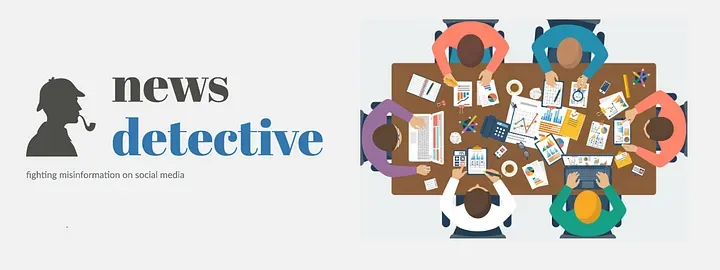“Brace yourself. The first AI elections are here.”
A Q&A with Ilana Strauss, founder of News Detective, a project incubated by Hacks/Hackers.

News Detective is a crowdsourced fact checking project that aims to fight misinformation at scale by increasing the pool of fact checkers, and in turn make fact checking more efficient. News Detective is currently developing a Reddit bot for an 80,000-person climate change online community and is in early discussions with BlueSky, a 13 million-user (as of October 2024) social media platform interested in using News Detective for fact checking on their platform. The startup, founded by Ilana Strauss, has received incubation support from MIT DesignX and Hacks/Hackers.
This article was originally published on Misinfocon.com in July, 2024.
Q: Tell us about News Detective
Ilana Strauss: News Detective uses the “wisdom of crowds” to fact check the internet and increase media literacy across different online communities. Any News Detective user can submit a post from a social media platform for fact checking, and platforms can link back from the social media posts to the fact checks
Styled on Wikipedia’s hierarchy, News Detective empowers the “crowd” to fact check claims and stories, but professional fact checkers also moderate and provide oversight. News Detective partners with social media platforms who need fact checking, and college and university students, who learn media literacy.
The students fact check social media posts, providing evidence and sources, and a professional fact checker moderates their fact checking. Successful fact checks appear directly on social media posts. Students simultaneously learn media literacy and bring reality to the internet at a scale that the small number of professional fact checkers in the world could never achieve.
Q: How has the recent explosion of new AI technologies affected News Detective?
Ilana Strauss: Humans are no longer the whole story when it comes to fact-checking. Since the launch and rapid adoption of generative AI tools such as ChatGPT in late 2022, as a founder I’ve really had to rethink the role of AI in News Detective.
As recently as a couple of years ago, I assumed AI had no place in fact checking. After all, any AI would necessarily take on the biases of its programmers, was my assumption. I also thought that fact checking is about finding sources, not spitting out information based on the likely biased information an algorithm has been told to examine.
However, after thinking about and working with fact checking as I build News Detective, I’ve come to realize that AI likely has a role in this work… it’s just that fact checking is not AI’s defining role.
It’s true that AI can read more sources in an hour than a human can in a year. But only humans can decide what these sources mean and ultimately make a judgment call. At least, that’s my theory at the moment.
I would suggest the American news cycle has been in freefall ever since the internet burst onto the scene thirty years ago and unleashed its content-creation powers upon us. And yet, despite all of the concerns about misinformation since the 2016 election, we may remember these last few years as “the good old days,” thanks to generative AI.
Q: How are new AI technologies affecting journalism and online credibility during an election year?
Ilana Strauss: The upcoming fall 2024 American presidential election won’t merely have the regular amount of spin and misinformation that we have come to expect during presidential elections. The big guns have arrived: generative artificial intelligence is here.
Artificial intelligence can be used to create a practically limitless number of articles, photos, and videos to try and sway voters. In 2023, a deepfake video showing Joe Biden making transphobic comments circulated. AI-doctored images of Donald Trump giving Dr. Anthony Fauci a hug also made the rounds. These events give us a taste of what is to come. Democracies rely on citizens having access to truth so that they can vote accordingly.
My question is: How will our democracy react to what will surely be an avalanche of fake articles, photos, and videos?
Q: In an era of AI, will improving media literacy in turn help credibility online?
Ilana Strauss: A few years ago, I heard people often talking about how news consumers would simply believe whatever they saw. But every action has a reaction, and news consumers of today are not news consumers of years past. If yesterday’s public used to believe whatever they saw in print and in video, today’s public increasingly doubts what they see with their own eyes.
From my experience building a community of more than 1,000 volunteer fact checkers at News Detective, I wish I could say that means people are becoming more discerning and learning media literacy skills to help them distinguish between fact and fiction.
But from what I’ve observed, something quite different seems to be happening. Because people know anything they see could be misinformation, they simply believe what they like and chalk up the rest to “fake news.” AI will likely accelerate this trend.
Since any information that counters someone’s worldview will automatically be viewed as “fake,” people will be less likely to take in information that makes them think critically and challenge their worldviews. Those on the right will likely reject left-leaning information as misinformation, and vice versa. The news-consuming public will become increasingly partisan and close-minded.
Not that this trend is endless or inevitable. Many have been trying to find solutions to this possible dark future.
Q: What’s next for News Detective?
Ilana Strauss: New Detective has recently partnered with two more universities, and we’ve also received a grant from the International Fact-Checking Network (IFCN), which is funded by Google and YouTube. We’re also excited to partner on a fact checking initiative with BlueSky, the newish 5 million user social media platform founded by a Twitter founder.
And we will be amping up just in time for the upcoming election, in which AI will undoubtedly have a massive role. News Detective community fact checkers will likely encounter claims spread by artificial intelligence. A multitude of other solutions — X’s Community Notes, for instance — will also be tested.
A few questions I have include:
Will humans be able to take on the machines, or at least use good machines against bad ones?
Will AI turn us all into critical-minded media-literate detectives or cynical partisans?
As AI evolves, how will news consumers change their behavior?
Hopefully, we will start to get the answers to some of these questions, and a solution will emerge. Our democracy may depend on it.
Based on Wikipedia’s decentralized, grassroots model, News Detective’s crowdsourced fact-checking community addresses misinformation at scale by increasing the pool of fact checkers and making fact checking more efficient. Prior to receiving Hacks/Hackers incubation support over the course of the grant period, News Detective, with support from MIT DesignX and MIT Sandbox, built a test product with a community of 1,000+ volunteer fact checkers.



